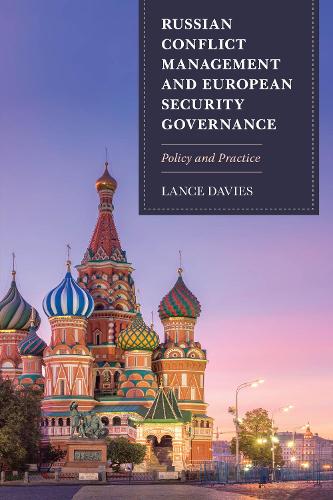
Russian Conflict Management and European Security Governance: Policy and Practice
(Hardback)
Available Formats
Publishing Details
Russian Conflict Management and European Security Governance: Policy and Practice
By (Author) Lance Davies
Bloomsbury Publishing PLC
Rowman & Littlefield International
30th September 2020
United Kingdom
Classifications
Professional and Scholarly
Non Fiction
Politics and government
Central / national / federal government policies
355.033547
Physical Properties
Hardback
318
Width 160mm, Height 230mm, Spine 29mm
667g
Description
Russia's controversial involvement in the conflict in Ukraine since 2014 has raised important enquiries into Russia's understanding of conflict management and its approach to contemporary European security. This book provides a timely and contextual exploration of Russia's post-Soviet legacy of conflict management in the backdrop of its interaction with Europe's system of security governance. By exploring Russia's approach from the early 1990s to the beginning of Vladimir Putin's third presidential term, the book offers a comprehensive exploration into the evolution of Russian behaviour. The book investigates whether Russia's approach has developed in accordance with the policies and practices of security governance that have emerged in the European 'experience' of conflict management. Together with extensive documentary analysis, the book employs the framework of security governance to examine Moscow's behaviour across a set of case studies situated in the European political and security environment. It offers a timely contribution to our understanding of Russia's response to intra-state conflict and its engagement with its contemporary security environment.
Reviews
The arguments presented in the book are nuanced and plausible. Davies surely has a point in claiming that a paradigm shift in Russian policies did not take place in relation to Ukraine. Furthermore, he is successful in reconstructing the Russian perspective on the different conflicts and relevant 'western' initiatives. An understanding of these perspectives and their genesis is of high value for both scholars and policymakers.... Davies' argument that Russian interventions in Ukraine have to be understood in their wider context and are shaped by more complex conjunctures than commonly anticipated is profound and reveals the necessity to recalibrate the dominant interpretations of the conflict. His book is a good read for both academics and students who want to reassess the current debate on the topic or to read comprehensively on Russian conflict management in Europe.
This book is a significant contribution to the field of conflict management and conflict resolution, peace studies, security and international relations, and is highly recommended to all researchers, scholars and analysts who are interested in Russian foreign policy and its relations with European structures.
With this book Davies makes an original departure from the numerous analyses of Russian foreign policies and security approaches vis--vis European security governance. Through a series of detailed case studies, mostly from the Putin era, examining Croatia, Bosnia and Herzegovina, Kosovo, Georgia, Moldova, and Ukraine, the author posits that from Russia's perspective its security interests are legitimate and should be soberly considered despite European distrust of Putin's Russia. Recommended.
Author Bio
Lance Davies is currently a research fellow at the School of Politics and International Relations, University of Nottingham.
